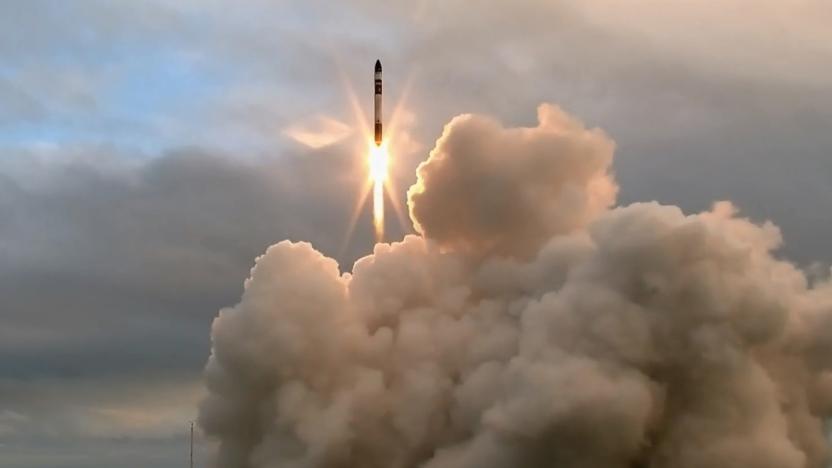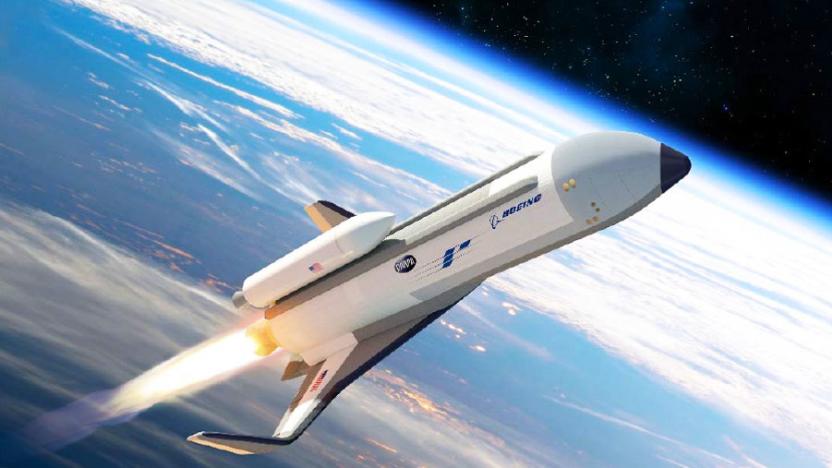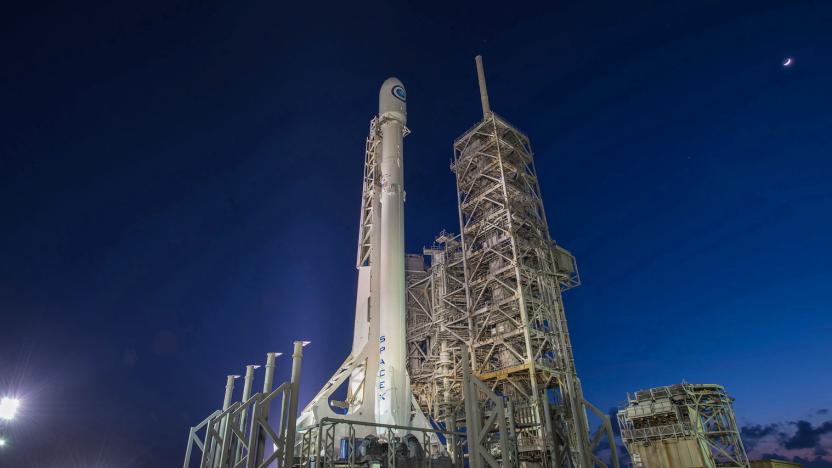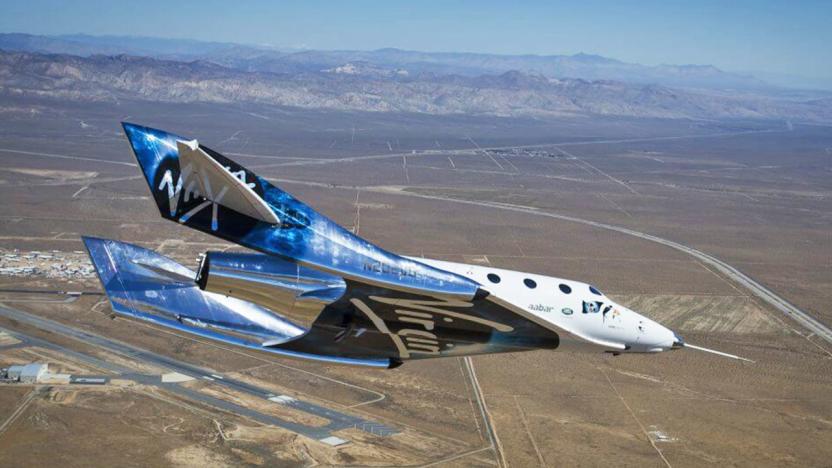TL17SPCSHP
Latest

Rocket Lab nails first orbital rocket launch from a private pad
Rocket Lab has successfully launched its 56-foot-tall Electron rocket for the first time. The relatively tiny vehicle, designed to ferry small payloads to orbit, reached outer space around 20 minutes past midnight (Eastern time) on May 25th. Rocket Lab opened its 10-day launch window on May 21st and had to scrub three times due to poor weather conditions. Now that Electron was finally able to head outside our planet's atmosphere, the company also became the first to launch an orbital-class rocket from a private facility.

SpaceX begins test-firing parts of its biggest rocket
Sorry folks, things are about to get heavy, by which we mean that SpaceX has begun test-firing the boosters for the Falcon Heavy. The company posted a clip of the event from last week, showing a side booster being put through its paces. Elon Musk subsequently tweeted that, when the Falcon Heavy launches, it'll be this powerful, but "times three." The CEO added that "one way or another, launch is guaranteed to be exciting."

Boeing is building DARPA's new hypersonic space plane
A few years ago, DARPA started work on a new experimental aircraft project called the XS-1, a vehicle designed to make launching satellites a faster, less expensive endeavor. Today, that project just took a huge leap forward: DARPA has announced that it's partnering with Boeing to build its next generation hypersonic space plane. Specifically, the aircraft manufacturer has been tapped to complete advanced design work on the XS-1 project, following up on the concept Boeing pitched to the agency during the project's early stages -- which it will now help build and test over the next several years.

Watch SpaceX push the Falcon 9 rocket to its limits (updated)
SpaceX launches are seldom boring, but its next mission will be notable precisely for what isn't happening. Elon Musk's outfit is poised to launch the Inmarsat-5 F4 broadband satellite on May 15th at 7:20PM ET, and the payload is both so heavy (13,448lbs) and going into such a high orbit (22,000 miles) that the Falcon 9 rocket won't have enough propellant left to land. That's right -- although SpaceX had hoped to make a habit of reusing rockets, this vehicle won't be returning safely to terra firma. This weight shouldn't be an issue once Falcon Heavy is available, but the larger rocket won't be ready to fly for a while.

Virgin Galactic tests Unity's re-entry system for the first time
Virgin Galactic has successfully tested its newest spacecraft's "feather" re-entry system for the first time. That's what it calls the mechanism wherein the vehicle folds up its twin tail booms so that it can behave more like a capsule and increase stability upon re-entry into the Earth's atmosphere. Virgin has conducted VSS Unity's flight test from the Mojave Air and Space Port after testing its feathering mechanism on the ground extensively. It's imperative for the company to make sure that its re-entry system works perfectly, seeing as it was created to replace a vehicle that broke apart after one of its pilots triggered the same mechanism below the ideal speed.

Blue Origin's New Shepard wins prestigious aeronautics award
Blue Origin's New Shepard rocket has been winning awards left, right and center, but this one is "personally meaningful" for company chief Jeff Bezos. The reusable rocket has been chosen to receive the Collier Trophy for 2016, presented to those who've made the "greatest achievement in aeronautics or astronautics in America" for the past year. New Shepard is the latest in the list of impressive awardees, which include Boeing for the 747 and its successors, the Navy for its autonomous X-47B aircraft and NASA JPL for landing Curiosity on Mars.

Blue Origin shows how 'New Glenn' rocket will fly and land
Yesterday Blue Origin showed off the BE-4 engine for its "New Glenn" rocket, and today CEO Jeff Bezos revealed its launch customer and an animation showing how it'll fly. Its new ship is capable of putting a 50-ton payload into a low-Earth orbit or 14 tons in a geosynchronous orbit and then landing the first stage on a moving barge (video, below). That's nearly identical, of course, to what the SpaceX Falcon 9 can do. Blue Origin has also landed the New Shepard's first stage multiple times (on land), but it's not an orbital-capable rocket like the Falcon 9.

NASA may rely on Russian shuttles for ISS missions until 2019
NASA is considering buying seats aboard the Soyuz spacecraft for 2019, according to a solicitation it filed recently. The agency originally wanted to end its dependence on Russia's Soyuz spacecraft this year, but SpaceX and Boeing aren't quite ready to take astronauts to the ISS. Boeing had to push back its first manned flight to the space station to December 2018 or later due to a design flaw with the Starliner. SpaceX also had to delay its plans after a Falcon 9 exploded on the launch pad last year. While both companies could very well be able to stick to their new timelines, NASA could be eyeing the purchase as an insurance in case of additional delays. Besides, seats on the Soyuz keep getting more expensive every year.

NASA seeks public input on how to cut SLS and Orion costs
NASA has admitted in its latest Request for Information (RFI) that it's spending a bit too much money on the Space Launch System's and the Orion capsule's development. The agency is asking for public input on how to minimize the "production, operations and maintenance costs" of the rocket-and-spacecraft system -- an issue it needs to address soon since it will be under a new administration within a couple of months.

Boeing pushes space taxi's first ISS mission to late 2018
Boeing's CS-100 Starliner won't be ferrying astronauts to the ISS until December 2018 (or maybe even later), according to Aviation Week. The aerospace corp was supposed to help end NASA's dependence on Russia's Soyuz rockets by 2017, but it announced in May this year that its space taxi won't be ready until mid-2018. Unfortunately, Boeing has no choice but to delay that historic flight even further due to a handful of manufacturing issues.




